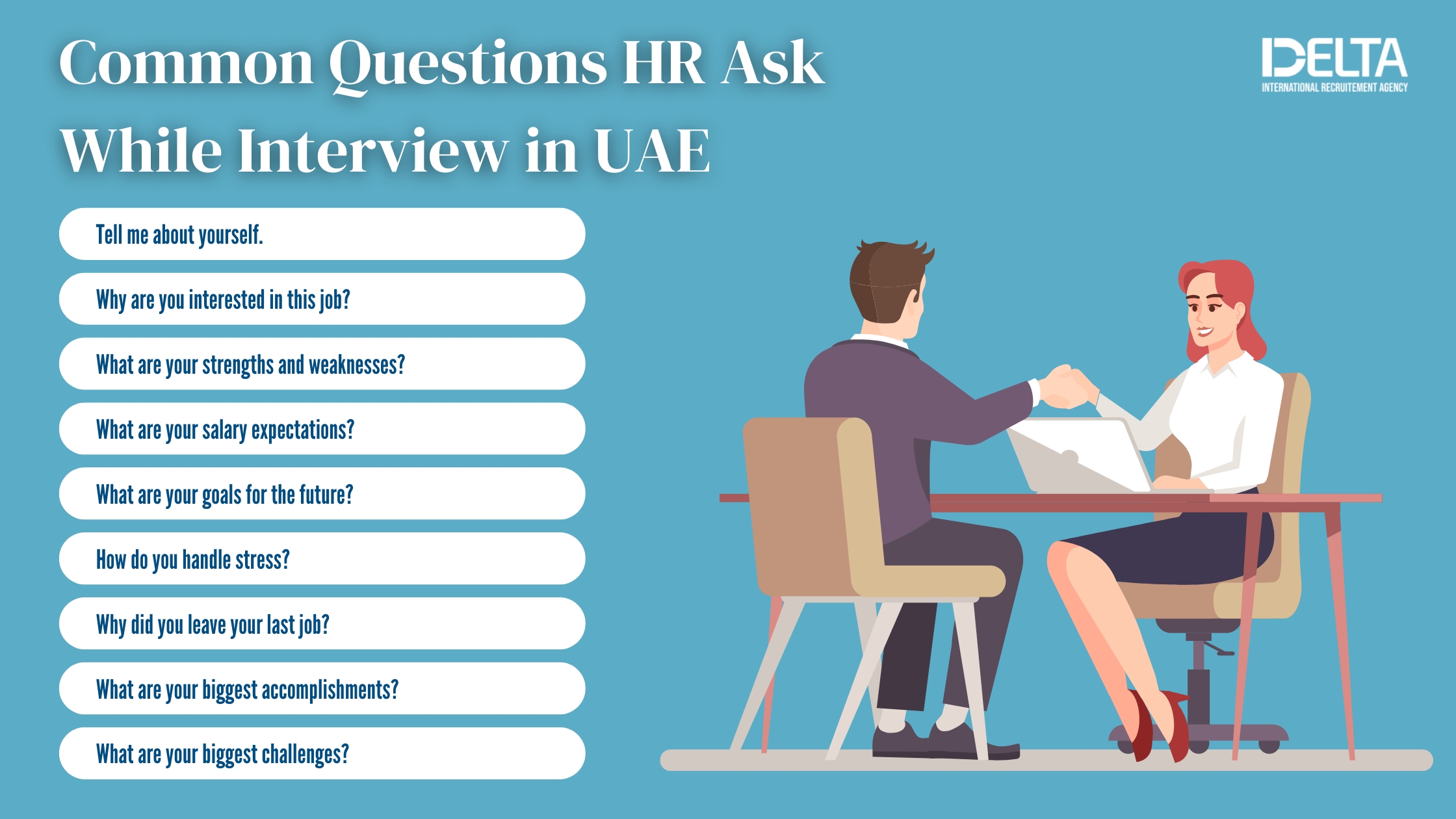Human resources (HR) interviews are a critical part of thehiring process in whole UAE. They allow employers to assess the skills,experience, and personality of potential employees.
In this guide, we will provide you with an overview of HRinterview questions, methods to answer them, and advice on how to negotiateyour salary. We will also cover cultural interview questions, which arebecoming increasingly important in today's globalized workplace.
Common HR Interview Questions for Dubai
Here are series of the most common HR interview questions inUAE that you may be asked:
- Tell me about yourself.
- Why are you interested in this job?
- What are your strengths and weaknesses?
- What are your salary expectations?
- What are your goals for the future?
- How do you handle stress?
- Why did you leave your last job?
- What are your biggest accomplishments?
- What are your biggest challenges?

List of Common Questions HR Ask While Interview in UAE
HR Interview Questions Answered in UAE (with Templates!)
Here's a breakdown of some common interview questions, alongwith easy-to-understand answers and templates you can use to craft your ownresponses:
1. Tell me about yourself.
- Example Answer: Briefly introduce yourself and your career path, highlighting relevant skills and experiences for the position. End by mentioning your enthusiasm for the opportunity.
- Template: "I'm [Your Name] and I have [X years] of experience in [Your Field]. Throughout my career, I've developed strong skills in [Skill 1], [Skill 2], and [Skill 3]. In my previous role at [Previous Company], I [mention a relevant achievement]. I'm particularly interested in this position at [Company Name] because [mention something specific about the company or role that excites you]."
2. Why are you interested in this job?
- Example Answer: Show genuine interest in the company and the specific role. Highlight aspects of the job description that resonate with your skills and goals.
- Template: "I'm interested in this position because [mention something specific about the job description]. My background in [your skill] aligns well with the requirement for [mention a specific responsibility]. I'm also impressed by [Company Name]'s work in [mention a specific project or area of interest]."
3. What are your strengths and weaknesses?
- Strengths: Focus on strengths directly related to the job.
- Weaknesses: Choose a weakness you've actively worked on improving.
- Strengths Template: "One of my strengths is [strength 1]. For example, in my previous role, I [mention a specific situation where you used that strength]. I'm also strong in [strength 2] because [brief explanation]."
- Weaknesses Template: "A weakness I'm working on is [weakness]. I've been improving by [mention an action you've taken]. This has helped me to [demonstrate progress]."
4. What are your salary expectations?
- Do your research! Know the average salary range for the position and your experience level. Be flexible and open to negotiation.
- Template: "Based on my research and experience, I'm targeting a salary range of [mention range]. I'm confident that I can bring significant value to this role, and I'm open to discussing compensation based on the specifics of the position."
5. What are your goals for the future?
- Show ambition and how this role aligns with your long-term goals.
- Template: "My long-term goal is to [mention your career goal]. This position at [Company Name] is a great opportunity for me to develop my skills in [mention relevant skills] and gain experience in [mention relevant area]. I believe it would be a stepping stone towards achieving my future goals."
6. How do you handle stress?
- Focus on your coping mechanisms and ability to prioritize.
- Template: "I manage stress by [mention specific strategies, e.g., prioritizing tasks, taking breaks, asking for help]. In a fast-paced environment, I stay calm by [mention how you stay focused under pressure]."
7. Why did you leave your last job?
- Be honest, but positive. Focus on why the new opportunity is a better fit.
- Template: "I left my previous position at [Previous Company] because [brief explanation, e.g., I was looking for a new challenge/opportunity to grow in a specific area] . This role at [Company Name] aligns well with my skills and career goals because [mention how the new role is a better fit]."
8. What are your biggest accomplishments?
- Highlight achievements relevant to the job. Use the STAR method (Situation, Task, Action, Result) to structure your answer.
- Template: "One of my biggest accomplishments was [achievement]. At my previous company, I was tasked with [Situation]. I took action by [Action], which resulted in [positive Result]."
9. What are your biggest challenges?
- Similar to weaknesses, choose a challenge you've overcome.
- Template: "One of the biggest challenges I faced was [challenge]. I overcame this by [action taken]. This experience helped me develop my [mention a skill you gained]."
Remember, these are templates, so feel free to personalizethem based on your specific experiences and the job you're interviewing for.Good luck with your job search!

Image Source: blog.hubspot.com
How to do Salary Negotiation in Dubai?
Once you have received an offer, it is important tonegotiate your salary. This is your chance to get the best possible salary foryour skills and experience.
There are a few things to keep in mind when negotiating yoursalary. First, do your research and find out what the average salary is foryour position in the UAE. This will give you a starting point for yournegotiations.
Second, be prepared to justify your request. Explain why youdeserve a higher salary than the offer that was made. This could include yourskills, experience, and education.
Third, be willing to compromise. The hiring manager may notbe willing to give you everything you want, but you may be able to reach amutually agreeable salary.
Finally, be confident and assertive. Don't be afraid to askfor what you want. The worst that can happen is that the hiring manager saysno.
Here are some tips for negotiating your salary:
- Do your research and find out what the average salary is for your position in the UAE.
- Be prepared to justify your request. Explain why you deserve a higher salary than the offer that was made.
- Be willing to compromise. The hiring manager may not be willing to give you everything you want, but you may be able to reach a mutually agreeable salary.
- Be confident and assertive. Don't be afraid to ask for what you want.
By following these tips, you can increase your chances ofgetting the best possible salary for your skills and experience.
Thank You Notes for Your UAE Interviewer
After an interview, it is important to send a thank you noteto the interviewer. This shows your appreciation for their time andconsideration, and it also gives you an opportunity to reiterate your interestin the position.
Your thank you note should be brief and to the point. Itshould include the following information:
- Your name
- The date of the interview
- The name of the interviewer
- A brief statement of your interest in the position
- A thank you for their time and consideration
You can write your thank you note on a formal businessletterhead, or you can simply send an email. If you are sending an email, besure to use the interviewer's name in the subject line and to personalize themessage.
Here is an example of a thank you note that you can use as astarting point:
Template for Thank You Notes
Dear Mr./Ms. [Interviewer's name],
I am writing to thank you for taking the time to interviewme for the [position name] position on [date]. I enjoyed learning more aboutthe company and the opportunity to discuss my qualifications with you.
I am confident that I have the skills and experience thatyou are looking for in a [position name]. I am a highly motivated andresults-oriented individual with a strong track record of success. I am also ateam player and I am confident that I would be a valuable asset to your team.
Thank you again for your time and consideration. I lookforward to hearing from you soon.
Sincerely,
[Your name]











.webp)
















